Middle East Political Economy Summer Institute Network
SUMMER INSTITUTE PARTICIPANTS
2018 Workshop: Students
Khuloud Alsaba

Khuloud Alsaba is a PhD candidate in Social Policy, within the International Public Health Unit, School of Social and Political Sciences, University of Edinburgh. Her research focuses on social and political determinants of health, health inequalities, and public policies. She is currently completing her thesis on aspects of militarization and political economy of the conflict in Syria and their impact on population health. . She is holding a PhD Chrystal Macmillan studentship at Global Health Policy Unit, University of Edinburgh, and was awarded Sir William Darling Memorial Prize of the University of Edinburgh in 2015 for advancing the University of Edinburgh reputation.
After attaining an MSc in health inequalities and public policy in Edinburgh University in 2011, she came back to Syria and joined the Syrian Centre for Policy Research working on the impact of the conflict in Syria on population health. Khuloud has 9 years of research experience in development and humanitarian sectors in Syria and Iraq, she also worked as a field humanitarian coordinator and interlocker with MSF, UNICEF, UNDP, Red Crescent Communities in Iraq, Syria, Lebanon, and Jordan, and served as the health officer for the ICRC field team in Syria.
After attaining an MSc in health inequalities and public policy in Edinburgh University in 2011, she came back to Syria and joined the Syrian Centre for Policy Research working on the impact of the conflict in Syria on population health. Khuloud has 9 years of research experience in development and humanitarian sectors in Syria and Iraq, she also worked as a field humanitarian coordinator and interlocker with MSF, UNICEF, UNDP, Red Crescent Communities in Iraq, Syria, Lebanon, and Jordan, and served as the health officer for the ICRC field team in Syria.
Nimrod Ben Zeev

Nimrod Ben Zeev is a Ph.D. candidate at the University of Pennsylvania's Department of History. His work focuses focuses on the sensory history and the political economy of construction work, the construction industry, and the built environment in Palestine/Israel from the British mandate period to the late 20th century.
Aviv Derri

Aviv Derri is a doctoral candidate in History and Middle Eastern & Islamic Studies at New York University. She is writing her dissertation, entitled “Credit, Debt, and the Politics of Favor: non-Muslim merchant-banking families in Ottoman Damascus and its hinterland, 1840-1890,” under the supervision of Zachary Lockman, Leslie Peirce, and Fred Cooper.
Her dissertation deals with the political economy of credit and debt in nineteenth-century Ottoman Damascus. As part of a broader argument concerning Ottoman imperial strategies to rule difference, it focuses on the role of local Christian and Jewish financiers in the provincial administration and economy during the period of state-led “reform” and in the larger context of global financial capitalism.
Aviv’s dissertation research has been supported by the Economic History Association and more recently by the Posen Foundation. Her research interests include finance capitalism in the Middle East, global networks of credit and trade, imperial financial governance, agrarian studies, and the comparative study of empires.
Her dissertation deals with the political economy of credit and debt in nineteenth-century Ottoman Damascus. As part of a broader argument concerning Ottoman imperial strategies to rule difference, it focuses on the role of local Christian and Jewish financiers in the provincial administration and economy during the period of state-led “reform” and in the larger context of global financial capitalism.
Aviv’s dissertation research has been supported by the Economic History Association and more recently by the Posen Foundation. Her research interests include finance capitalism in the Middle East, global networks of credit and trade, imperial financial governance, agrarian studies, and the comparative study of empires.
Tamer Elshayal
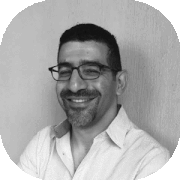
Tamer Elshayal is a PhD student in urban studies at Harvard University. His research – at the intersection of urban theory, critical geography, and development studies – seeks to examine the shifting spatialities and political economies of mega-projects and large infrastructural networks in postcolonial Egypt. Tamer’s doctoral project focuses on infrastructures of mobility, particularly roads and highways, and how they mediated reconfigurations of state space and state power over the last four decades in Egypt.
He holds a Master of Design Studies in urbanism, landscape and ecology at Harvard’s Graduate School of Design (GSD) and a Master of Landscape Architecture from FH Anhalt, Germany. Tamer is a research member of the Urban Theory Lab at Harvard’s Graduate School of Design. He has previously worked as landscape planner in Germany and Egypt, and as a research associate and GIS specialist at the Center for the Documentation of Cultural and Natural Heritage, Bibliotheca Alexandrina, Egypt.
He holds a Master of Design Studies in urbanism, landscape and ecology at Harvard’s Graduate School of Design (GSD) and a Master of Landscape Architecture from FH Anhalt, Germany. Tamer is a research member of the Urban Theory Lab at Harvard’s Graduate School of Design. He has previously worked as landscape planner in Germany and Egypt, and as a research associate and GIS specialist at the Center for the Documentation of Cultural and Natural Heritage, Bibliotheca Alexandrina, Egypt.
Safa Joudeh

Safa Joudeh is a PhD candidate in development studies at SOAS University of London. Her research focuses the differential development of economic zones in Egypt and Tunisia. It explores the impact of international capital on developing distinct GVC participation patterns within globally linked production sites, bearing on the formation of distinct spaces in relation to the rest of the economy, and with particular attention to the movement of knowledge and technology into these spaces.
Cynthia Gharios
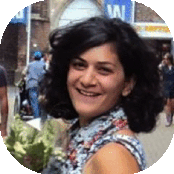
Cynthia Gharios is a PhD candidate at the Graduate School Global and Area Studies at the University of Leipzig. She graduated from the American University of Beirut with a BSc in Landscape design and eco-system management and from Wageningen University with a MSc in Cultural Geography. Her research focuses on food security challenges and the increasing financialisation of the agri-food sector in the Middle East and North Africa (MENA). She develops a multi-dimensional analysis of food investors from the GCC in other Arab World countries, and analyses the mechanisms and actors in the development of investments. Using a multi-sited empirical approach and adopting technography approach, she analyses the development of sustainable intensification and precision agriculture. The research adopts a theoretical viewpoint based on the political economy of food to provide a critical study of agrarian transformation. Her research is funded by the German Academic Exchange Service (DAAD) and she is affiliated with the SFB1199 project at the University of Leipzig. She has previously worked on agrarian transformation in South Lebanon, and is currently involved in a project on agricultural war damage in Yemen.
Rebecca Gruskin
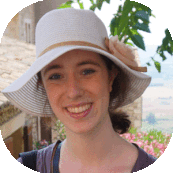
Rebecca Gruskin is a Ph.D. candidate in History of the Modern Middle East at Stanford University. Her dissertation explores the social history of Tunisia’s Gafsa phosphate-mining basin from the 1890s-1960s, with a focus on local practices of resistance, Gafsa’s place in the global market for phosphates, environment and re-made geographies, and embodied questions about health, pollution, and disease.
Rebecca spent most of 2016 and 2017 conducting archival research in Tunis and France and oral historical interviews in the Gafsa mining towns, first on an AIMS Long-Term Research Fellowship and then on a CAORC Mediterranean Regional Research Fellowship. In addition to her research, Rebecca designed and taught a sources and methods seminar at Stanford on the transnational history of post-WWII counterinsurgencies.
Rebecca spent most of 2016 and 2017 conducting archival research in Tunis and France and oral historical interviews in the Gafsa mining towns, first on an AIMS Long-Term Research Fellowship and then on a CAORC Mediterranean Regional Research Fellowship. In addition to her research, Rebecca designed and taught a sources and methods seminar at Stanford on the transnational history of post-WWII counterinsurgencies.
Dima Krayem

Dima Krayem is a second year Ph.D. student in Development Studies at the University of Cambridge, UK. Her research focuses on explaining how the Lebanese government and its policies, and the international humanitarian regime govern and manage Syrian refugees and their vulnerable hosts. Another aspect of her research focuses on the type of interaction, and processes of ‘integration’ that have developed in urban settings in Lebanon, between Syrian refugees and their Lebanese hosts as a lived reality rather than an active government policy tied to permanent resettlement and citizenship. Particular focus of her research is on developing an appropriate framework that incorporates different actors in managing and experiencing the Syrian refugee situation in Lebanon, and explaining how they constantly shape and reshape each other.
Dima graduated Magna Cum Laude with a B.A. in Economics from the University of California, Santa Cruz in 2009. Upon graduating, she worked in the Office of Technical Assistance Management at the IMF in Washington DC. She also worked on a UNHCR project on Mapping the Living Conditions of Refugees in Lebanon, before attending Yale University for a specialized Master’s degree in International and Development Economics. Following her graduation in 2013, Dima returned to Lebanon and joined the World Bank country office as a Research Analyst in Human Development. In her three years at the World Bank, she worked on both operational and analytical projects related to the Syrian crisis in Lebanon. The former included projects in the fields of social protection and education aimed at mitigating the impact of the Syrian conflict on Lebanon. The latter include a multi-agency study of the "Economic and Social Impact Assessment of the Syrian Conflict on Lebanon” and the “Lebanon Systematic Country Diagnostic”. Between 2014 and 2016, Dima was also a part-time economics instructor at the Lebanese American University.
Dima graduated Magna Cum Laude with a B.A. in Economics from the University of California, Santa Cruz in 2009. Upon graduating, she worked in the Office of Technical Assistance Management at the IMF in Washington DC. She also worked on a UNHCR project on Mapping the Living Conditions of Refugees in Lebanon, before attending Yale University for a specialized Master’s degree in International and Development Economics. Following her graduation in 2013, Dima returned to Lebanon and joined the World Bank country office as a Research Analyst in Human Development. In her three years at the World Bank, she worked on both operational and analytical projects related to the Syrian crisis in Lebanon. The former included projects in the fields of social protection and education aimed at mitigating the impact of the Syrian conflict on Lebanon. The latter include a multi-agency study of the "Economic and Social Impact Assessment of the Syrian Conflict on Lebanon” and the “Lebanon Systematic Country Diagnostic”. Between 2014 and 2016, Dima was also a part-time economics instructor at the Lebanese American University.
Mariz Kelada
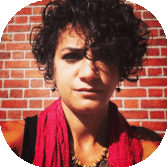
Mariz Kelada is PhD student in the department of Anthropology at Brown university and is simultaneously pursuing her MA is the department of Modern Culture and Media, having received the Open Graduate Education Fellowship (2018). Her academic work is deeply intertwined and fueled by her life and work as a cultural practitioner in Egypt. That is why she is crafting her academic knowledge to be interdisciplinary, practically political, and engaged with communities. Her PhD research focuses on the makings of the political economy of the film industry in Egypt, through a specific engagement with the livelihoods of its technical workers, in addition to theories and methodologies of visual anthropology. A paper based on her initial theoretical framing of the project is forthcoming in Cairo Papers in Social Sciences' quarterly edited volume. She also received the Mellon Graduate Fellowship in Collaborative Humanities (2018). Moreover, Kelada was trained in the NIA-Ethnofest Summer School of Visual Ethnography of Cityscapes in Athens, July 2017. She aims to develop ways of conjoining academic knowledge with 'street'/vernacular knowledge, especially through cultural spaces and artistic collectives.
Prior to her PhD, Kelada completed a BA in English Literature at Cairo University in 2011, and MA in Anthropology and Sociology at the American University in Cairo 2014. Her MA thesis: “Makings of Imagination in Alternative Cultural Spaces in Cairo” was based on a yearlong ethnographic fieldwork, part of it was published in the International Journal of Sociology in 2014. Since 2010 she worked in the Egyptian alternative cultural sector on diverse projects, performances, researches and films, and co-managed the Independent Film School of Cairo in 2015.
Prior to her PhD, Kelada completed a BA in English Literature at Cairo University in 2011, and MA in Anthropology and Sociology at the American University in Cairo 2014. Her MA thesis: “Makings of Imagination in Alternative Cultural Spaces in Cairo” was based on a yearlong ethnographic fieldwork, part of it was published in the International Journal of Sociology in 2014. Since 2010 she worked in the Egyptian alternative cultural sector on diverse projects, performances, researches and films, and co-managed the Independent Film School of Cairo in 2015.
Layla Hashemi
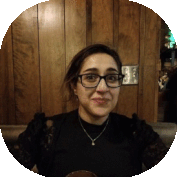
Layla M. Hashemi is an Adjunct Professor of Political Science at Montgomery College and a third year Policy PhD student at George Mason University’s Schar School. Ms. Hashemi’s work experience includes various governmental and non-governmental organizations including Forum 2000 (Prague, Czech Republic), The Journal of Civil Society and The Terrorism, Transnational Crime and Corruption Center (TraCCC). Layla earned her M.A. in International Relations and Comparative Politics at New York University with a concentration in Middle Eastern and Islamic Studies.
Thayer Hastings

Thayer Hastings is a doctoral student at The Graduate Center, CUNY in New York City where he is studying the anthropology of race, colonialism and nationalism with a focus on the Arab world. He holds an M.A. from the Georgetown University Center for Contemporary Arab Studies and a B.A. from the University of Washington in Seattle. He is currently a Policy Member of al-Shabaka Policy Network and a volunteer mentor to young Palestinians pursuing higher education in the US.
José Ciro Martínez

José Ciro Martínez is a PhD student in the Department of Politics at the University of Cambridge and Visiting Researcher at the Instituto de Estudios Sociales Avanzados (IESA) in Córdoba, Spain. His research interests include: food politics, welfare regimes, theories of the state, political economies of development, and agrarian/food sovereignty movements. His dissertation examines the bread subsidy in Jordan. It analyzes the interaction between market-disciplinary economic reforms, state subsidy policy and the politics of bread in the country. The project has included periods of ethnographic fieldwork, during which José has worked in three different bakeries in Amman.
Jacob Mundy
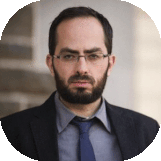
Jacob Mundy is an Associate Professor in the Peace & Conflict Studies and Middle Eastern and Islamic Studies programs at Colgate University. He has conducted research on organized violence and intervention in Western Sahara, Morocco, Algeria and Libya. His books include Libya (Polity, 2018), Imaginative Geographies of Algerian Violence (Stanford 2015), The Post-conflict Environment(Michigan, 2014) coedited with Dan Monk, and Western Sahara: War, Nationalism, and Conflict Irresolution (Syracuse 2010), coauthored with Stephen Zunes. During the 2018-19 academic year, he will be a Fulbright Scholar at the University of Tunis. His current research explores issues of technological governance in modern Libya.
Tareq Radi
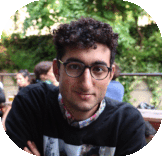
Tareq Radi will be a first year doctoral student in American Studies at New York University this fall. He recently completed an MSc in Globalization and Development at the School of Oriental and African Studies (SOAS). Prior to his studies at SOAS he was the Public Affairs Coordinator at Georgetown University’s Center for Contemporary Arab Studies. He hosts the program “Reclaiming Academic Freedom” for the audio journal Status. Tareq is a co-producer of the pedagogical film Gaza in Context, and co-edited Gaza in Context: War and Settler Colonialism, with George Mason Professor Noura Erakat. He holds a B.S in Finance from George Mason University (GMU), where he was a founding member of GMU’s Students Against Israeli Apartheid (SAIA). Tareq’s research interests include critical geography, the political economy of housing, settler colonialism, racial capitalism, and migration theory.
Schluwa Sama

Schluwa Sama is a doctoral student at the Centre for Kurdish Studies at the University of Exeter. Her dissertation explores capitalism and different colonialisms in Iraqi Kurdistan by focusing on the everyday life of peasants and farmers in Amadiye, Iraqi Kurdistan. Schluwa holds an MSc in 'Middle East Politics‘ from SOAS, University of London.
Omar Sirri
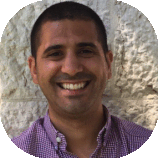
Omar Sirri is a PhD candidate in political science at the University of Toronto. His doctoral dissertation is an ethnography of law and security practices in contemporary Baghdad, with a focus on: how anti-terrorism law is applied (and combatted) by legal actors; the governance effects of police and military checkpoints that still dot Baghdad’s urban landscape; and the impact that (in)security has on political economy and gentrification in Baghdad. Omar is an active member in the Middle East Studies Association (MESA), and currently serves as the student representative on its Board of Directors.
Kenza Yousfi
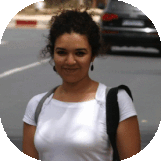
Kenza Yousfi is a PhD student in Anthropology at the University of Texas at Austin. She graduated from the American University in Cairo with a Master’s in Gender Studies and from Al Akhwayn University in Ifrane with a Bachelor’s in International Relations. Her research is on the politics of walling in northwest Africa in the contemporary moment, focusing on infrastructure and political economy of the Saharan wall, resource-making of the phosphates and fertilizers, and new conceptions of territoriality and state-making. She has done extensive fieldwork in Morocco, Algeria, Western Sahara, Mauritania and Senegal throughout the past eight years. She is doing her doctoral work in Anthropology as a way to engage with the mediation between large infrastructures of capital, states, policies, and populations and the ordinary, particular, and everyday conceptions of contemporary politics. Her research recent has been supported by the Graduate School at the American School in Cairo and the Bernard and Audre Rapoport Center for Human Rights and Justice. Other than her scholarly work, she is a feminist activist and served on the Young Feminist Fund advisory where she played a pivotal role in structuring the current regional advisory and in strategic direction.


